Cracking the code of your rescue Chihuahua’s behavior can be quite a ride, especially when they’re carrying some heavy baggage from their past. Getting the hang of their unique story and needs is the golden ticket to building a strong bond and helping them fit snugly into their new home.
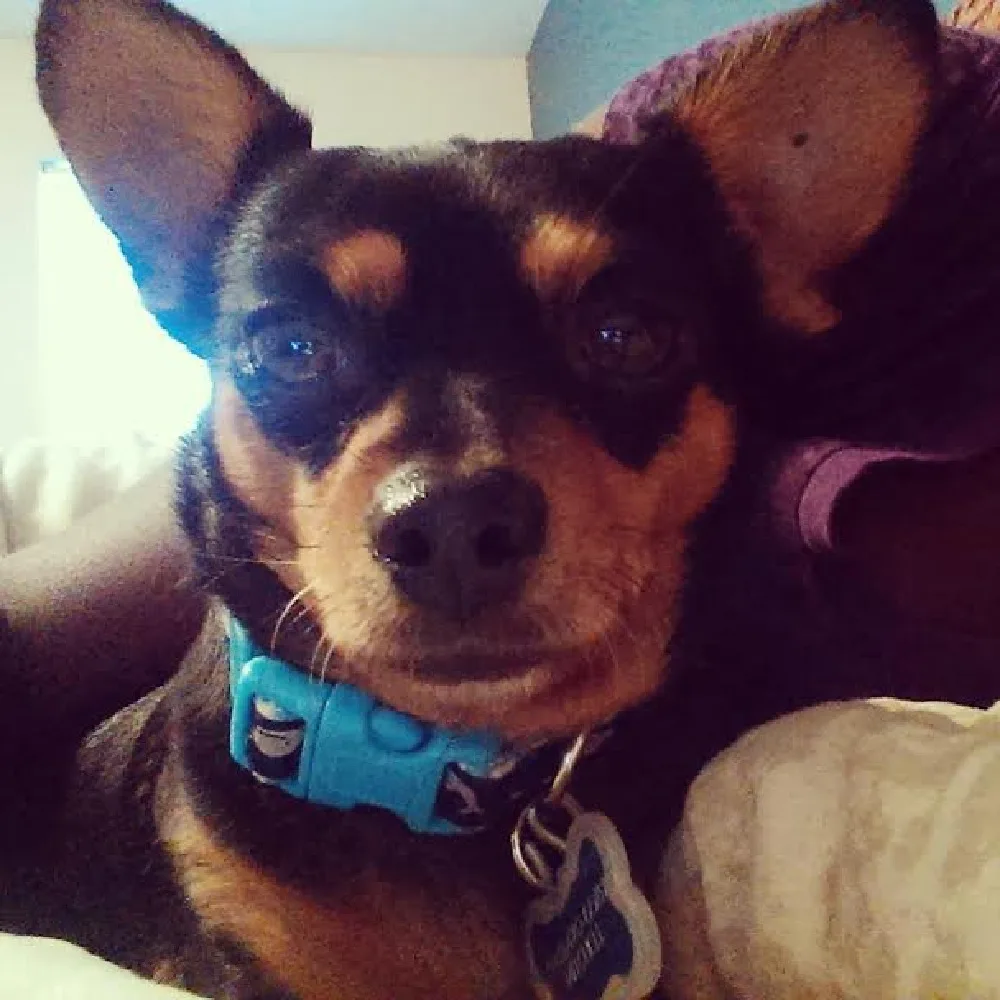
So, buckle up as we head out on an adventure into the wild and wonderful world of Chihuahua behavior, getting up close and personal with their natural instincts, behaviors, and how their past experiences mold them into the individuals they are today.
On this quest, we’ll lift the lid on our rescue Chihuahua’s unique expressions and offer up some handy tips and tricks to tackle any specific concerns and build a bond that’s built to last. By getting clued up on their past, we can craft a warm and supportive future for our rescue Chihuahuas. It’s all about love, understanding, and a touch of dog whispering!
Chihuahuas: Their Cool Origins and Rescue Tales
Chihuahua History and Breeding
Let’s chat about Chihuahuas – those adorable little guys with a history that goes way back to ancient Mexico. People think they’re the grandpuppies of the Techichi dog, a petite pal that the Toltec civilization really dug.
By getting into the backstory of Chihuahuas, we find ourselves appreciating and relating to our rescue fur babies in a whole new way.
The reason you see Chihuahuas of all sorts of shapes and sizes is because of years of breeding. So, they could be all sorts of colors, with fur of various lengths, and heads of different shapes. Their cute size and unique look have made them popular cuddle buddies around the world.
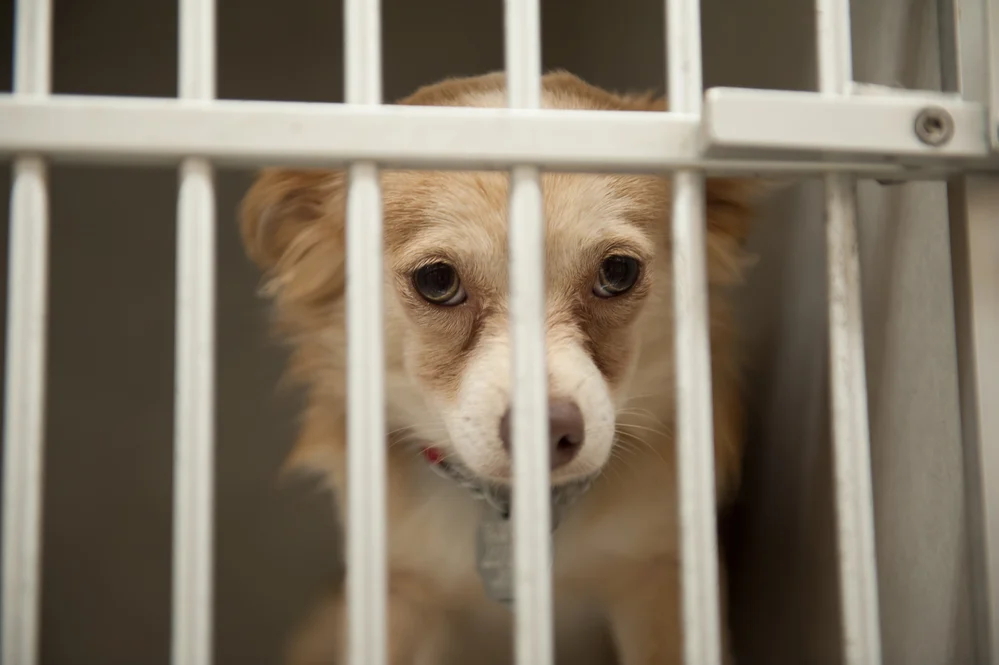
Where Rescue Chihuahuas Usually Come From
Rescue Chihuahuas could come from all sorts of places. Sometimes they’re saved from hoarders, puppy mills or rough situations where their safety is on the line. In moments like these, super dedicated rescue groups jump in to save the day. Organizations like the Chihuahua Club of America’s rescue arm have gotten their paperwork in order, got a 501c3 status, all to help protect Chihuahuas who need a little extra help.
Remember, a bit of exercise goes a long way for our rescue Chihuahuas. It helps them shake off any extra energy and stops them from picking up destructive habits. Giving them regular chances to go for walks, runs, or trips to the small dog park helps them get used to their new lives.
Keep in mind that our rescue Chihuahuas each have their own story and might need some time and patience to get used to their new digs. Understanding where they come from and how they got rescued helps us give them the care and support they need to really blossom in their new homes.
Footnotes
Understanding Your Rescue Chihuahua’s Past Baggage
When you’ve got a rescue Chihuahua, it’s super important to spot any signs of past trauma in your little buddy. Knowing what they’ve been through can help us give them the right care and support. In this part, we’ll chat about some physical hints and behavior changes that might show your rescue Chihuahua has had some rough times in the past.
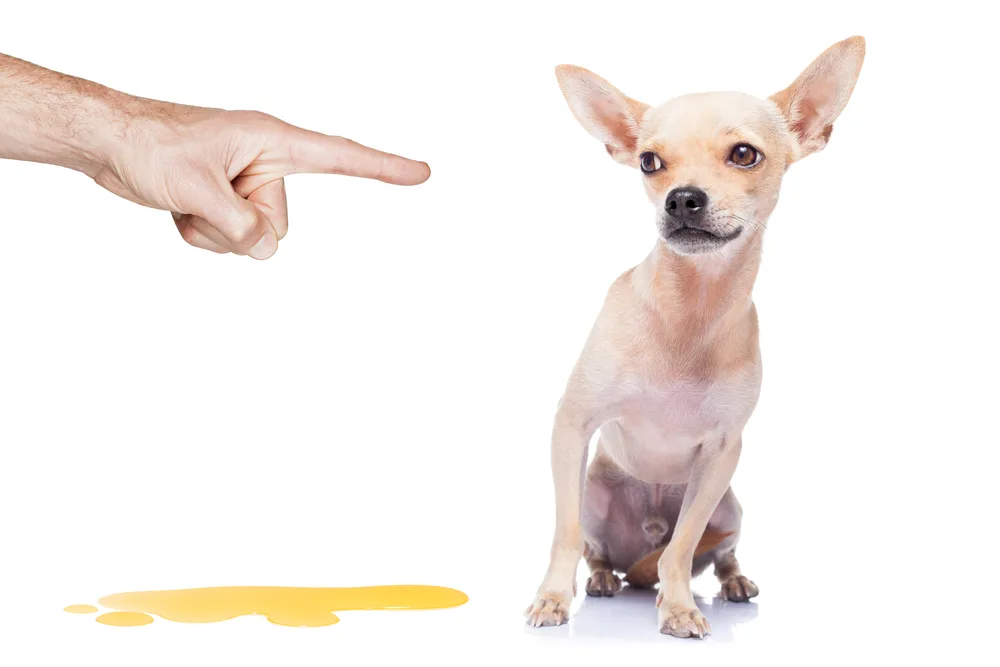
Physical Signs to Look Out For
Sometimes, bad experiences from before can leave physical traces on our furry friends. Here are some telltale signs:
- Shaking: Shivering or shaking can be a sign of trauma if your dog does it a lot around certain triggers.
- Panting: If your dog pants a lot, even when they haven’t been running around, it might mean they’re feeling stressed or anxious about something from their past.
- Urination and defecation: Your Chihuahua might pee or poop unexpectedly when they’re around something that triggers them.
Keep your eyes peeled for these signs and hit up your vet if you think your rescue Chihuahua might be stressed because of past trauma.
Behavioral Red Flags
Apart from physical signs, past trauma can also show up in how a dog acts. Some behaviors to watch for include:
- Hiding: If your Chihuahua tends to hide or tries to run off in certain situations or around certain people, they might have been traumatized before.
- Howling and barking a lot: A lot of howling or barking could be another sign of past trauma.
- Pacing: If your Chihuahua can’t seem to sit still and paces around a lot, it might mean they’re anxious because of past experiences.
Getting to know these signs can help us understand our rescue Chihuahuas better and create a safe, loving space for them to heal from their past traumas. If you spot any of these behaviors in your Chihuahua, it might be time to have a chat with your vet.
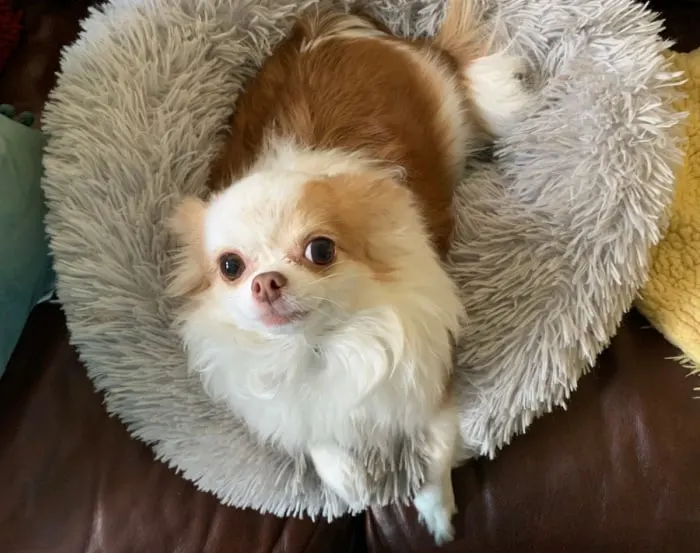
Building Trust With Your Rescue Chihuahua
Making a Safe Home
When you adopt a rescue Chihuahua, it’s a big deal to help them work through trust issues. The first thing you can do is make them feel safe at home. A scared Chihuahua might seem a bit snappy, but with some patience and TLC, they can start to relax.
Try to give them a nice, quiet spot where they can chill out, like a crate or a corner with some cozy bedding and their favorite toys or blankets. Let them explore at their own speed, avoiding any sudden movements or loud sounds that might freak them out.
Get them to meet family members one by one, using treats and praises to help them learn that new things can be good.
Sticking to a Routine
Another key to gaining trust is to get a routine going. Chihuahuas, like all dogs, love knowing what’s going to happen next, and a regular schedule can help them feel more at home. Try to have set times for meals, potty breaks, walks, and playtime. This routine will help lessen their anxiety and help them settle into their new home.
If your Chihuahua has been mistreated in the past, getting into a routine might be tough. In cases like these, you might want to ask a professional animal behaviorist to help you come up with a plan that suits your dog’s needs.
Remember, earning your rescue Chihuahua’s trust can take some time and patience. By giving them a safe space and a routine, you’ll be well on your way to helping them trust again and live their best life with you.
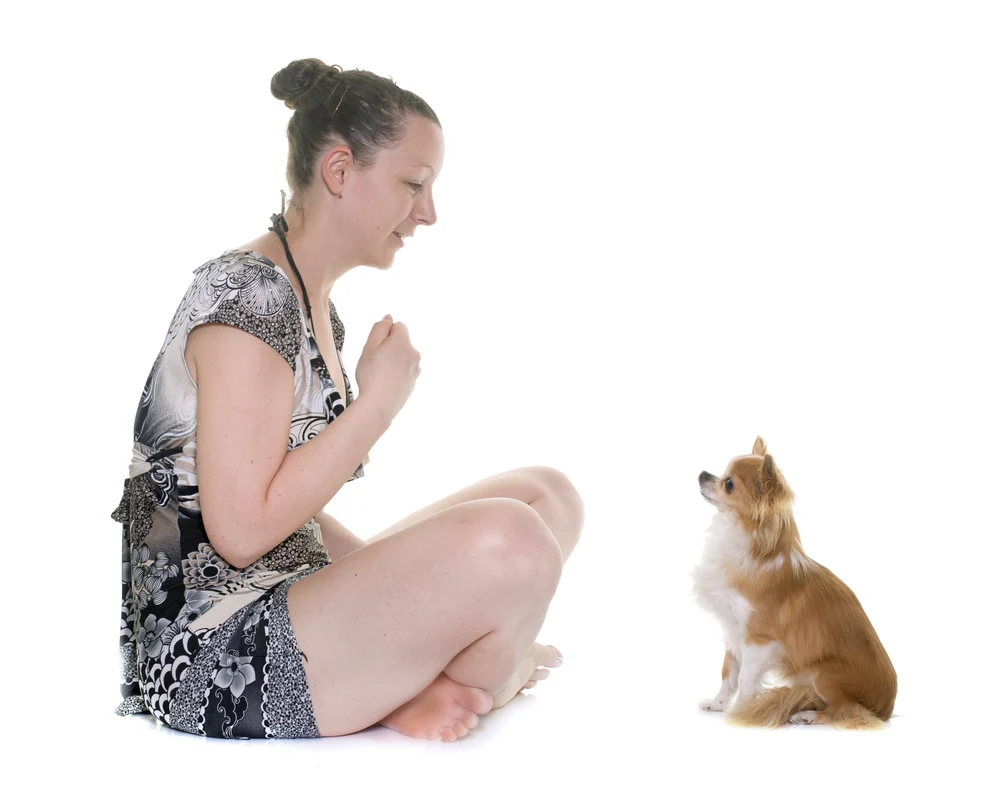
Training Your Chihuahua
Training a rescue Chihuahua might have its own hurdles, but with some patience and understanding, you can build a relationship based on trust. It’s super important to remember what they’ve been through in the past when you’re planning your training and communication strategy.
The Power of Positive Reinforcement
One big part of training a rescue Chihuahua is using positive reinforcement. This means giving your dog a treat, a pat, or some praise when they do something you like. There are lots of vet-approved positive training methods out there that you can try with your Chihuahua.
If you keep rewarding good behavior, your Chihuahua will start to connect good feelings with doing the right thing:
- When you’re house training, give your dog a reward right after they go where they’re supposed to.
- If your Chihuahua is wary of new people, reward them for staying calm when they meet strangers.
- Try some simple commands like “sit” and “stay,” and give your dog a reward when they get it right.
Tackling Tough Behaviors
Rescue Chihuahuas might sometimes act out because of what they’ve been through before. The key is to stay patient, consistent, and gentle when you’re working with them.
If your dog is scared because of something bad that happened to them, you can help them overcome their fear by building positive associations.
For sound fears, gradually expose your dog to the noise and give them a reward for staying calm.
If your dog has separation anxiety, gradually increase the time they spend alone to help them feel more comfortable in their new home.
In short, being understanding and using positive reinforcement when you’re training and communicating with your Chihuahua can help bring out the best in them. By tackling any behavioral issues and bearing their past in mind, you can build a solid bond with your furry friend.

Getting Close with Your Chihuahua
Bonding with a rescue Chihuahua? Yep, it’s a bit of a unique journey, but oh-so rewarding. When we welcome these little furballs into our homes, getting to grips with their past and understanding their quirky behaviors is key to building a solid connection.
In the beginning, it’s all about patience. Our Chihuahuas need time to get used to their new digs. They’ve got to feel safe and sound before they start feeling all lovey-dovey. Being patient and understanding can really help smooth the bonding process.
One awesome way to bond? Stay close to them. These little guys are territorial and love being with their humans, so they’re happy as clams when they can curl up on our laps. We should totally encourage this to help cement our bond with our rescue Chihuahua.
Training’s not just about obedience – it’s a great bonding tool too! Teaching them simple tricks and commands can help build their trust in us and strengthen our relationship.
Remember to make playtime and exercise part of the daily routine. It’s not just about tiring them out – it’s social time for dogs and a fab way to bond.
As we keep bonding with our rescue Chihuahua, let’s remember: it’s a marathon, not a sprint. It’ll take time and effort to fully understand their past and why they behave like they do. But if we’re patient, kind, and consistent, we’ll end up with a bond that’ll last a lifetime – and that’s a win-win situation for us both.
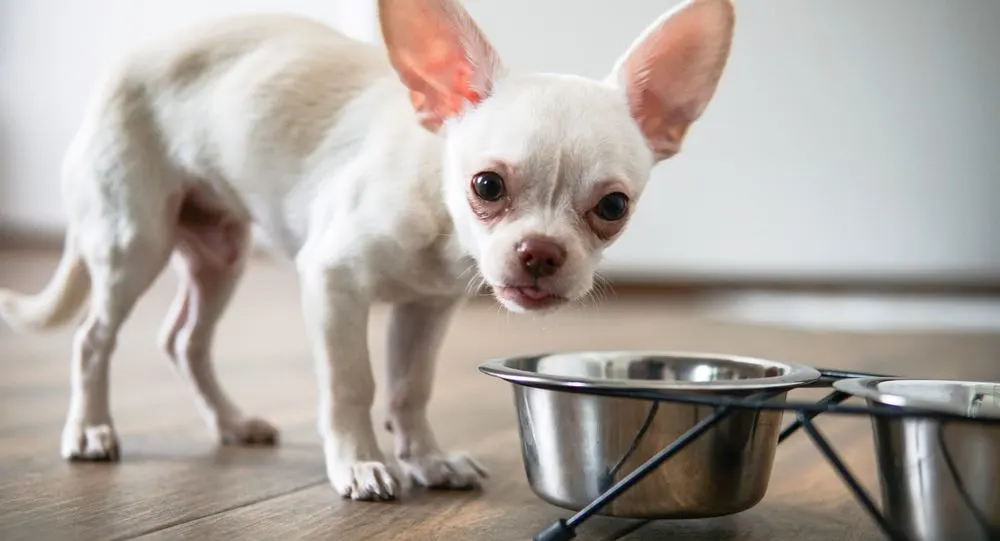
Health and Wellness
Nutritional Needs
As proud owners of rescue Chihuahuas, it’s essential for us to understand their unique nutritional needs. Chihuahuas are small dogs with fast metabolisms, so they require a diet that provides them with adequate energy to keep them active and healthy. Since they’re prone to obesity, we recommend a high-quality, portion-controlled diet. Some specific needs of Chihuahuas include:
- Protein: To maintain strong muscles, Chihuahuas need foods rich in protein. Look for dog food with high-quality animal protein sources.
- Fats: Healthy fats like omega-3 and omega-6 fatty acids help maintain their shiny coats and support brain development.
- Carbohydrates: Complex carbohydrates, like sweet potatoes and brown rice, provide sustained energy and support a healthy digestive system for our little friends.
- Vitamins and Minerals: Chihuahuas need a balanced blend of essential vitamins and minerals to support their overall health and well-being.
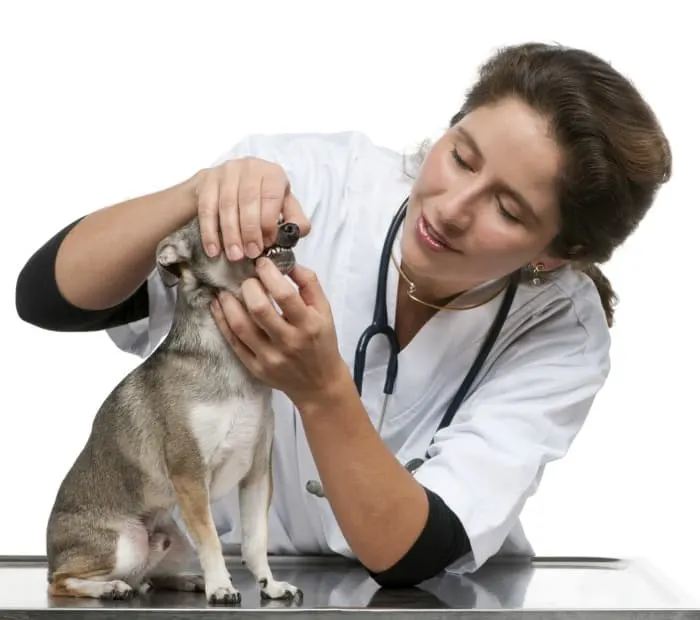
Veterinary Care
Veterinary care plays a crucial role in ensuring the overall health and wellness of our rescue Chihuahuas. Since Chihuahuas may have experienced neglect or health issues in their past, it’s essential to establish a strong relationship with a trusted veterinarian who understands their needs. Here are a few essential steps we recommend:
- Initial Checkup: When we bring our rescue Chihuahua home, schedule an initial veterinary checkup. This will help identify any underlying medical issues and start addressing them right away.
- Vaccinations and Preventatives: Keep their core vaccinations up to date and ensure they receive regular flea, tick, and heartworm preventatives, as recommended by the vet.
- Dental Care: Chihuahuas are prone to dental issues. We should provide them with regular at-home dental care and schedule professional cleanings as needed.
- Monitoring and Regular Checkups: Observe your Chihuahua for any changes in behavior, weight, or appearance. Regular veterinary checkups will help catch any potential concerns early and keep our little friends in the best possible health.
By getting the lowdown on what our rescue Chihuahuas need to eat and sorting out their vet care, we can make sure they’re living their best life with us, healthy and full of beans.
Wrapping It Up
In a nutshell, dealing with a rescue Chihuahua’s behavior boils down to three things: patience, empathy, and understanding. Recognizing signs of past trauma and working hard to build a strong bond can help them overcome their challenges. That way, we can create a loving, safe space where they can heal, both emotionally and physically.

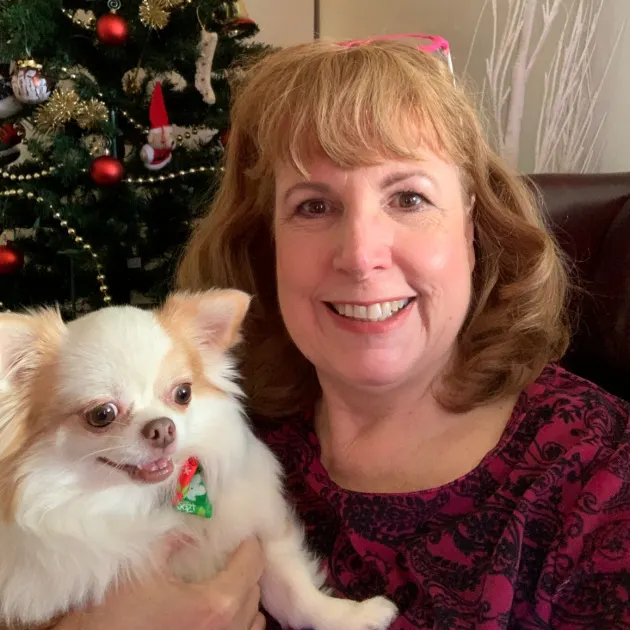
Cathy Bendzunas
Pet Blogger
Frequently Asked Questions
Chihuahuas have a variety of behavior signals that help them communicate their emotions and intentions. Some common signals include wagging their tails, vocalizing through barks or whines, and using body posture to show excitement, fear, or dominance. To better understand your Chihuahua’s behavior, pay close attention to their body language and any changes in their normal behavior patterns Understanding Dog Body Language.
Rescue Chihuahuas may express stress through body language, such as tucking their tail between their legs, lowering their head, or displaying submissive behaviors like rolling over. They may also respond with vocalizations, like whining or excessive barking. It’s essential to give your rescue Chihuahua time, patience, and help them relax as they adjust to their new home 10 Helpful Tips For Success When Adopting A Rescue Chihuahua.
Dominant body language in Chihuahuas may include standing tall with their chest out, raising their tail and ears, and showing assertive behavior around other dogs or humans. However, make sure you differentiate dominant behavior from aggressive behavior, as sometimes dominant behavior is normal during play or social interactions.
Aggressive behavior in Chihuahuas might include growling, showing teeth, snapping, or lunging at other dogs or people. This can often be accompanied by a hard stare or stiff body language Understanding Dog Body Language. Should your rescue Chihuahua display aggressive behavior, work on training and socialization to help modify their behavior in a positive manner.
Chihuahuas, like most dogs, thrive on attention and love from their human companions. They enjoy snuggling, playing, and spending time with their favorite people. Additionally, Chihuahuas are food-motivated and respond well to positive reinforcement using treats during training. To bond more deeply with your Chihuahua, make sure you provide them with exercise, mental stimulation, and affection Chihuahua Behavior: The Truth About Their Personality.
To better understand your Chihuahua’s communication, observe their body language, vocalizations, and behavior in different situations. Pay attention to how they react to new stimuli, other dogs, and people to learn their preferred communication methods. By understanding your Chihuahua’s unique personality and behavior, you’ll be able to provide them with a safe and comfortable environment that keeps them happy and healthy.

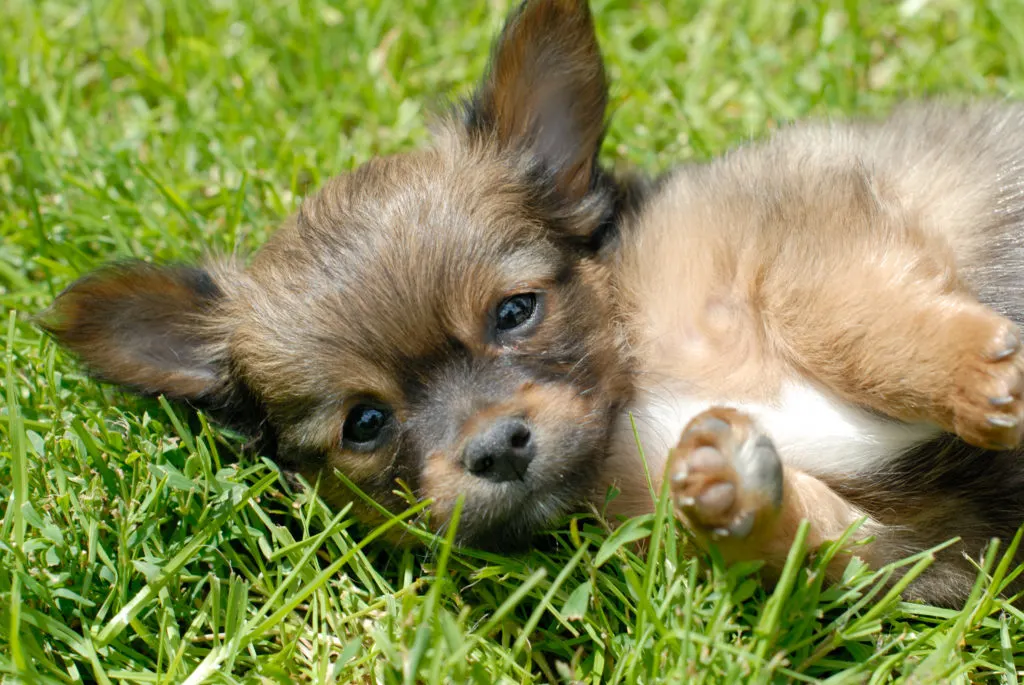
shirley adams
Sunday 26th of May 2024
Our chi was made in a horrible puppy mill mixed with a pom so he is a chi/pom, from birth to 5 years he suffered in this place, caged, starved, mistreated and then reported to animal authorites and rescued along with other dogs. We have had a learning experience with him (we call him Beau)and it breaks my heart thinking about what he went through all those years but we have had him for 3 years now, he is our baby, our child and it will kill me when he passes away. He knows me as "Momma" and my husband as "Daddy" He is starting to get the trach problem so this worries me.
Cathy Bendzunas
Sunday 26th of May 2024
I'm so glad he found a safe loving home with you and your husband Shirley. It breaks my heart how these little ones are treated.